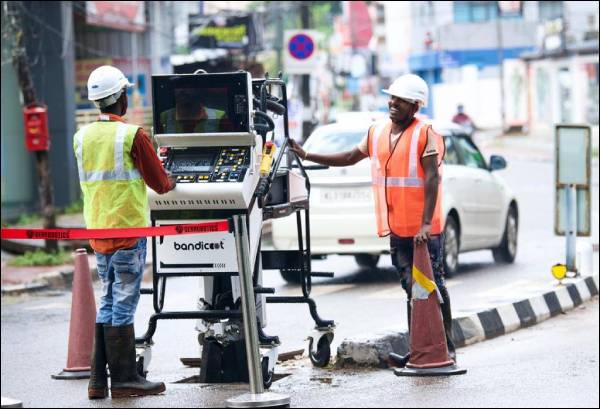
October7 2022: The manual cleaning and unblocking of septic tanks, sewers and drainage systems, has long been a socially unacceptable task that has been widely condemned by government and civil society in India. Yet the practice continues unabated in many places – to our collective shame – mainly for lack of a viable alternative.
That excuse is no longer acceptable: because this very Indian scourge has been addressed by concerned professionals: Made-in-India solutions that have stood rigorous testing and deployment in multiple towns, are now available, leveraging cutting-edge technology that eliminates all human intervention in sewerage environments that are both noxious and hazardous.
At the 2022 edition of the Swachhata Startup Challenge organized by the Union Ministry of Housing and Urban Affairs, in collaboration with the French Development Agency, AFD, which concluded recently, a robotic scavenger, – claimed to be a world-first – developed by Thiruvananthapuram- based Genrobotics -- was declared the top prize winner.
Named 'Bandicoot', for the animal which is known to make sewers its home, the solution also addresses the problem of employment, retraining manual scavenging personnel as robot operators, who, when positioned outside the manhole, safely control the robotic arms and legs which carry out the actual cleaning, while gas sensors provide alerts of any hazardous emissions from below. The Bandicoot can clean 10 manholes in a day compared to 3-4 by humans, leading to a saving of around Rs 8000 a day, estimate the developers. It is said to be superior to some sucking and grabbing machines which are unable to tackle solid waste clogging the sewers.
In the 4 years since the latest model was developed, Bandicoot has been deployed in 16 states, helping to rehabilitate some 1700 sanitary department workers. There are two other robotic variants -- 'Wilboar' for sewage treatment plants and 'G-Beetle' for high-rise façade cleaning.
Interestingly Indore, which was judged India’s cleanest city for the sixth year in a row, in an announcement by the government’s Swachhata Survekshan initiative last week, has been an early user of Bandicoot.
A spokesperson for Genrobotics told Swarajya that the company is also finding interest abroad: It has recently supplied robotic scavengers to Malaysia for deployment in Kuala Lumpur. Other (non-scavenging) robots have been supplied to hospitals in the UK for rehabilitation of persons with physical injuries. The company is also exploring markets in South Korea and the UAE.
Genrobotics was founded in 2017 by four engineering graduates—Vimal Govind M.K., Arun George, Nikhil N.P and Rashid K. -- incubated by the Kerala State Startup Mission and operates from the TechnoPark, in the Kerala state capital. In October 2018, the second, updated version of Bandicoot was launched by Prime Minister Modi.
Other sewage cleaners
Other approaches to specific aspects of sewage cleaning have also been realized in India:
- A robotic septic tank cleaner, developed at IIT Madras last year, which began as a final year Master’s project of a student, Divanshu Kumar. Called HomoSep, is being tried out at some 10 locations in Tamil Nadu. As the name suggests the equipment homogenizes the hard sludge using a rotary blade and pumps the slurry out with an integral suction device.
-The Central Mechanical Engineering Research Institute of CSIR, based in Durgapur unveiled a mechanical scavenging system in Octobver 2021 which could handle up to 300 mm pipes of length up to 100 metres. Read a report here.
These options cater to different use scenarios and different scales of operation; but together they hold out the hope that asking humans to perform the dangerous and degrading task of scavenging will soon—thanks to indigenous solutions --be something we can relegate to the past.
This is extracted from an article in Swarajya magazine online yesterday
For other winning entries in Swachhta Startup Challenge 2022, see Image of the Day